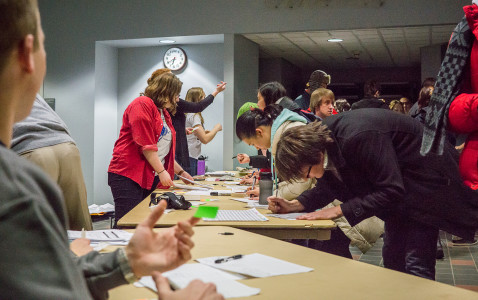
Lily Bohlke, Staff Writer
bohlkeli@grinnell.edu
On Monday, Feb. 1, the Iowa Caucuses took place across the state. In Grinnell, the caucuses were full of excitement, whether voters paper balloted at the Republican caucus or organized bodies into support groups at the Democratic caucus.
On caucus night, precincts across the state of Iowa voted to determine how 11,065 democratic delegates would be divided up at county conventions. Over the course of county and state conventions in the coming months, these 11,065 delegates will be narrowed to the 44 delegates that will represent Iowa at the National Democratic Convention.
The Harris Center appointed nineteen delegates to Bernie Sanders and seven to Hillary Clinton. Ultimately, however, Clinton won with 701 state delegate equivalents compared to 697 for Sanders and eight for O’Malley. These state delegate equivalents represent the corresponding proportion of precinct delegates at the state level.
The Republican caucus appoints delegates in a similar fashion. In one of the Republican Precincts at Grinnell High School, Grinnell students and townspeople awarded 27 delegates to Marco Rubio and 11 to Ted Cruz. Ultimately, Cruz won Iowa with 27.6 percent of the popular vote, Donald Trump winning 24.3 percent, and Rubio winning 23.1 percent.
Many students went out to caucus for the first time and had a chance to participate in the political sphere in an engaging way.
“[Voting] is how you let politicians know you exist and that your interests matter,” said Jackson Lea ’19.
The Republican precinct in Grinnell had a higher voter turnout than ever before, largely because the Republicans in town want their voices to be heard.
“The most people I have ever seen come out was about 40 people. But last night I had 142, because people want their voices to be heard,” said Tammy Kriegel, Poweshiek county leader for Marco Rubio.
Kriegel also expressed that Republican voter turnout in Grinnell is extremely important because there tends to be a Democratic lean. Many other townspeople agreed.
“The College brings a lot of people from elsewhere to our town. We don’t really reflect anything other than Democratic values,” said Grinnell community member Rachel Mahaffey.
Kriegel was especially pleased that her voice and the Republican votes resulted in Rubio’s majority in her precinct.
“[Rubio] relates to the middle class, he comes from nothing, and he is a good example,” Kreigel said. “I think people are finally getting to the point to appreciate that.”
The Rubio support group majority was surprising, especially because recent polls that suggested Donald Trump would win. In further primaries, however, Kriegel said that she expects Cruz and Rubio to lead over Trump.
“With all that’s going on in the Middle East and with our economy, we need someone with a political background to take care of the situation at hand,” she said.
At the Democratic caucus at the Harris Center, 925 people gathered to create support groups for candidates. After Martin O’Malley’s support group did not reach the required 15 percent to be viable, voters from both the Clinton and Bernie support groups tried to convince O’Malley supporters and undecided voters to join each respective support group.
Arguments for Sanders and Clinton filled caucus sites during the realignment period. Arguments in favor of Sanders included income justice and revolution, while those in favor of Clinton included women’s rights and electability. Despite the potential for the United States to make history with Clinton as the first female president, many students felt that policy should be favored over identity.
“Obama’s presidency made it very clear that just because someone in a marginalized group is president, that doesn’t actually mean that will make a difference at the bottom,” said Sandy Barnard ’17, Bernie Sanders preference group captain.
As for electability, Barnard said that voting for Clinton not because a voter agrees with her ideas but because a voter thinks that Sanders will not be elected goes against the ideals of democracy.
“Democracy is like money. It only works if you believe in it. Go with what you want, not what you begrudgingly think you should do,” Barnard said.
Both Barnard and Professor Barbara Trish, Political Science, said that although it is likely Sanders will win the New Hampshire primary, it is hard to predict what is going to happen long-term.
“You’ve got all these contests and each one is different,” Trish said. “The outcome of the previous contest affects the expectations for the next one.”
Trish added that a caucus is a way to bring out the passion in voting citizens. A Party meeting rather than a primary ballot forces a community to join together in support, even though it is hard to create efficiency when there are so many people.
“I think it’s mystifying,” said townsperson Joan Brand-Landkammer. “But I’m enjoying it very much.”




























































